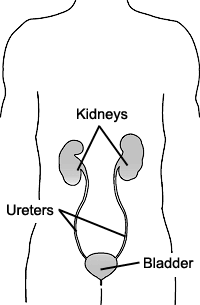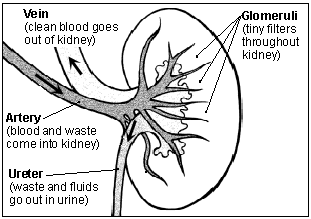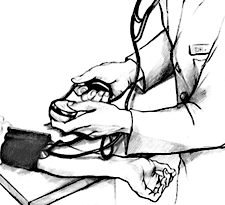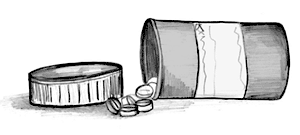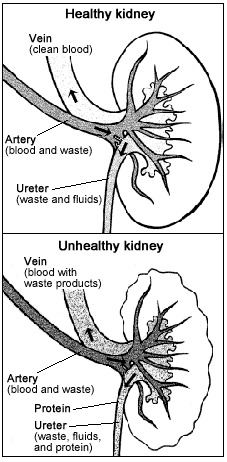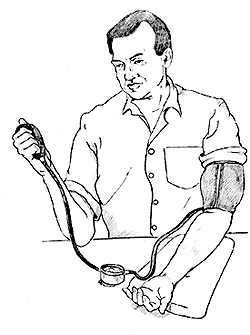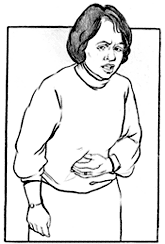

|
|
||||||||||||||||||||||||||||||||||
|
What are diabetes problems?
What should I do each day to stay healthy with diabetes?
What do my kidneys do? The kidneys act as filters to clean the blood. They get rid of waste and extra fluid. The tiny filters throughout the kidneys are called glomeruli (glo-MEHR-yoo-lie). When kidneys are healthy, the artery (AR-ter-ee) brings blood and waste from the bloodstream into the kidney. The glomeruli clean the blood. Then waste and extra fluid go out into the urine through the ureter. Clean blood goes out of the kidney and back into the bloodstream through the vein.
How can I prevent diabetes kidney problems? * Keep your blood sugar as close to normal as you can. Ask your doctor what blood sugar numbers are healthy for you. * Keep your blood pressure below 130/85 to help prevent kidney damage. Blood pressure is written with two numbers separated by a slash. For example: 120/70.
* Follow the healthy eating plan you work out with your doctor or dietitian. Change your meal plan as your doctor and dietitian suggest. They might suggest you eat less protein, sodium, and potassium. * Have your kidneys checked at least once a year by having your urine tested for small amounts of protein. * Have any other kidney tests that your doctor thinks you need. * See a doctor for bladder or kidney infections right away. You may have an infection if you have these symptoms: * Pain or burning when you urinate * Frequent urge to go to the bathroom * Urine that looks cloudy or reddish * Fever or a shaky feeling * Pain in your back or on your side below your ribs. Is there a medicine to slow down kidney damage? Yes. Your doctor might ask you to take a medicine called an ACE inhibitor (in-HIB-it-ur). This medicine helps control blood pressure. ACE inhibitors also help people with diabetes to slow down kidney damage by keeping the kidneys from cleaning out too much protein. New medicines now being tested may also hold promise.
How can my doctor protect my kidneys during special x-ray tests? If you have kidney damage, the liquid, called a contrast agent, used for special x-ray tests can make your kidney damage worse. Your doctor can give you extra water before and after the x-ray to protect your kidneys. Or your doctor may decide to order a test that does not use a contrast agent. How can diabetes hurt my kidneys? When kidneys are working well, the glomeruli keep protein inside your body. You need the protein to stay healthy. High blood sugar and high blood pressure damage the kidneys’ glomeruli. When the kidneys are damaged, the protein leaks out of the kidneys into the urine. Damaged kidneys do not do a good job of cleaning out waste and extra fluids. So not enough waste and fluids go out of the body as urine. Instead, they build up in your blood. An early sign of kidney damage is when your kidneys leak small amounts of a protein called albumin (al-BYOO-min) into the urine. With more damage, the kidneys leak more and more protein. This problem is called proteinuria (PRO-tee-NOOR-ee-uh). More and more wastes build up in the blood. This damage gets worse until the kidneys fail. Diabetic nephropathy (neh-FROP-uh-thee) is the medical word for kidney problems caused by diabetes.
What can I do if I have diabetes kidney problems? Once you have kidney damage, you cannot undo it. But you can slow it down or stop it from getting worse by doing the things listed in the sections. * How can I prevent diabetes kidney problems? * Is there a medicine to slow down kidney damage? * How can my doctor protect my kidneys during special x-ray tests?
How will I know if my kidneys fail? At first, you cannot tell. Kidney failure from diabetes happens so slowly that you may not feel sick at all for many years. You will not feel sick even when your kidneys do only half the job of normal kidneys. You may not feel any signs of kidney failure until your kidneys have almost stopped. However, getting your urine and blood tested every year can tell you if your kidneys are still working. Once your kidneys fail, you may feel sick to your stomach and feel tired all the time. Your skin may turn yellow. You may feel puffy, and your hands and feet may swell from extra fluid in your body.
What happens if my kidneys fail? First, you will need dialysis (dy-AL-ih-sis) treatment. Dialysis is a treatment that does the work your kidneys used to do. There are two types of dialysis. You and your doctor will decide what type will work best for you.
1. Hemodialysis (HE-mo-dy-AL-ih-sis). In hemodialysis, your blood flows through a tube from your arm to a machine that filters out the waste products and extra fluid. The clean blood flows back to your arm. 2. Peritoneal dialysis (PEH-rih-tuh-NEE-ul dy-AL-ih-sis). In peritoneal dialysis, your belly is filled with a special fluid. The fluid collects waste products and extra water from your blood. Then the fluid is drained from your belly and thrown away. Second, you may be able to have a kidney transplant. This operation gives you a new kidney. The kidney can be from a close family member, friend, or someone you do not know. You may be on dialysis for a long time. Many people are waiting for new kidneys. A new kidney must be a good match for your body. Will I know if I start to have kidney problems? No. You will know you have kidney problems only if your doctor tests your urine for protein. Do not wait for signs of kidney damage to have your urine tested. How can I find out if I have kidney problems? Each year make sure your doctor tests a sample of your urine to see if your kidneys are leaking albumin. If your kidneys are not leaking a lot of albumin, ask your doctor to check your urine for even smaller amounts of albumin. This is called microalbumin (MY-kro-al-BYOO-min). It is good news if your kidneys are not leaking even small amounts of albumin. Then you and your doctor know your kidneys are working well. Will my doctor do other kidney tests? Maybe. Your doctor might test your blood to measure the amounts of creatinine (kree-AT-ih-nin) and urea (yoo-REE-uh). These are waste products your body makes. If your kidneys are not cleaning them out of your blood, they can build up and make you sick. Your doctor might also ask you to collect your urine in a large container for a whole day or just overnight. |
||||||||||||||||||||||||||||||||||
